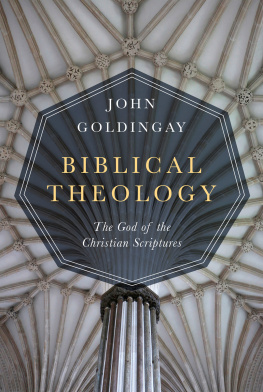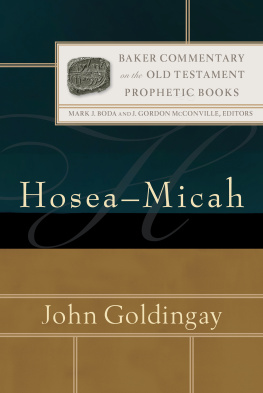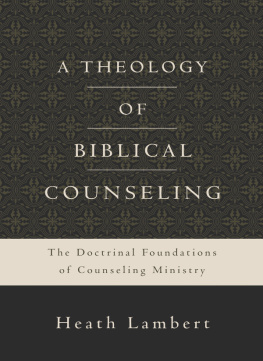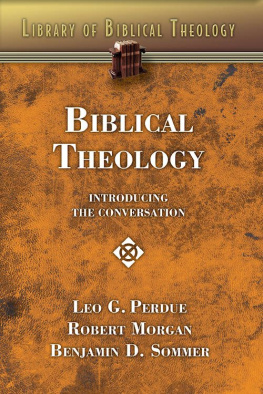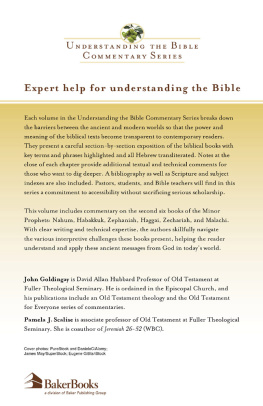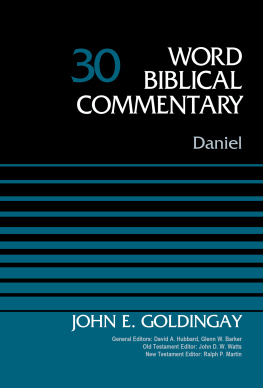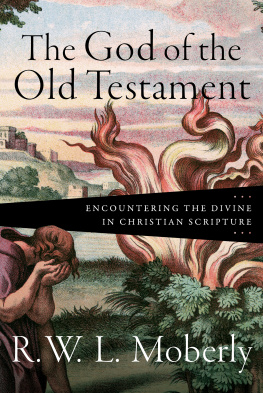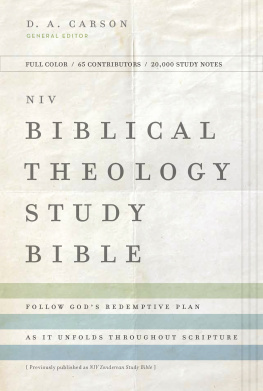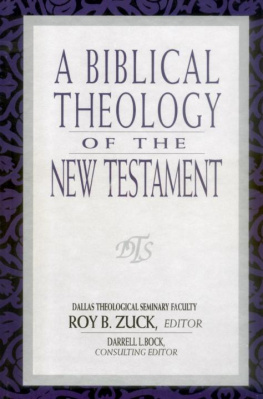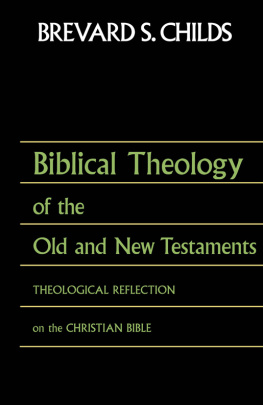BIBLICAL
THEOLOGY
The God of the Christian Scriptures
JOHN GOLDINGAY
InterVarsity Press
P.O. Box 1400, Downers Grove, IL 60515-1426
ivpress.com
2016 by John Goldingay
All rights reserved. No part of this book may be reproduced in any form without written permission from InterVarsity Press.
InterVarsity Pressis the book-publishing division of InterVarsity Christian Fellowship/USA, a movement of students and faculty active on campus at hundreds of universities, colleges and schools of nursing in the United States of America, and a member movement of the International Fellowship of Evangelical Students. For information about local and regional activities, visit intervarsity.org.
All Scripture quotations, unless otherwise indicated, are the authors translation.
Cover design: Cindy Kiple
Images: Langfactor/iStockphoto
ISBN 978-0-8308-7314-2 (digital)
ISBN 978-0-8308-5153-9 (print)
This digital document has been produced by Nord Compo.
To no one has [the Lord] given power to proclaim his works,
and who can fathom his mighty deeds?
Who can measure his majestic power,
and who can go on to recount his mercies?
It is not possible to lessen or increase them,
nor is it possible to fathom the Lords wonders.
When human beings have finished, they are just beginning,
and when they stop, they are still at a loss.
SIRACH 18:4-7
Mystery is the lifeblood of dogmatics.
BAVINCK, REFORMED DOGMATICS 2:29
(Its important to biblical theology, too.)
PREFACE
When I was writing an Old Testament Theology, a voice in my head told me that it should be a biblical theology. To consider the theological significance of the Old Testament in isolation was an odd exercise, given that the church acknowledges the two Testaments as its Scriptures. Admittedly, its not as odd an exercise as treating the New Testament in isolation. The Old Testament Scriptures do not presuppose the New, and they are not incomprehensible without the New, and the idea of someone in the year 10 BC asking about the theological contents of the Old Testament as a whole is not an incoherent one (if I may sidestep questions about when the precise list of its books became settled). In contrast, the New Testament presupposes the scriptural status of those writings, and asking about the New Testaments theological implications in isolation from them is a dangerously incoherent enterprise.
I had no answer of principle to the voice in my head, only the tactical conviction (implicit in that point about the danger of New Testament theology) that it was important to focus on the Old Testament to counterbalance the usual practice of ignoring it theologically. But I recognized the force of the voice, and this book is my attempt to meet its point.
In writing, I followed a similar procedure to the one I used for my Old Testament Theology. I made a list of possible chapter headings on the basis of my hunches as to what headings might be needed, and then began to read the New Testament and to make notes under those headings.
By working in this way I wanted to give priority to my reading of the Scriptures themselves and to let them set the agenda for the work. Having written an Old Testament Theology, I wasnt confident I could think through the Old Testament material afresh if I began there; it would be a rehash of previous work. Beginning with the New Testament gave me a different entry into the Old Testament material. In keeping with the way I went about the task, in presenting the material in this volume I often start with the New Testament, which has the advantage of starting where the church is, in its own greater involvement with the New Testament.
As well as studying the Scriptures, I read some commentaries and other works, and reshaped and developed the headings and the structure of the work as the data seemed to require it. On the way along, I added consideration of material from the Old Testament that linked with the various themes (and that did not), and did so more systematically when I had completed my initial work.
Beyond this preface and the introduction that follows, I do not discuss method or take up questions about the relationship between the Testaments. My most recent consideration of such questions turned into a book of its own, Do We Need the New Testament? The present book presupposes positions laid out there. It does pay proportionately more attention to the New Testament than that other title might suggest or than you or I might have expected. This characteristic reflects the method of working that started from the New Testament; it also means that I dont substantially repeat the contents of the Old Testament Theology and that Im not tempted to let this book get too long. Often I have simply indicated where a characteristically Old Testament theme fits, made a brief comment on it, and added some footnote references to material in the Old Testament Theology, though the three volumes of the latter include material that expands on almost every section of this book. I hold onto a silly hope that you might even be pushed into reading that work.
Biblical translations are my own unless otherwise indicated. In references such as Ps 31:19 [MT 20], the figures within the square bracket indicate the versification in printed Hebrew Bibles where this differs from the versification in English Bibles. In the New Testament, I usually translate the Greek word christos as Anointed rather than using the transliteration In speaking of the origin of biblical books such as Jeremiah or Matthew or Ephesians, I often refer to the authors of the entire books by the names traditionally associated with them, without meaning to imply that I necessarily have a view on the authors actual identity.
I have used the following abbreviations:
I am grateful to Thomas A. Bennett and to Kathleen Scott Goldingay for their careful reading and comments on a draft of this book, as of many others. I occasionally refer to them in footnotes, but their contribution is greater than these references imply. And Im grateful to Anna Lo for compiling the indexes. Its also time I expressed my gratitude for the advice and support of Dan Reid, my editor at IVP, who has also given me such wise advice and support over quite some years. The last suggestion in connection with this volume was to tell you that I was making the last touches to its text as the Rose Parade made its way past our house on South Orange Grove Boulevard in Pasadena, California, on New Years Day 2016.
CD | Karl Barth, Church Dogmatics. 13 vols. Edinburgh: T&T Clark, 19361969 |
JBL |

